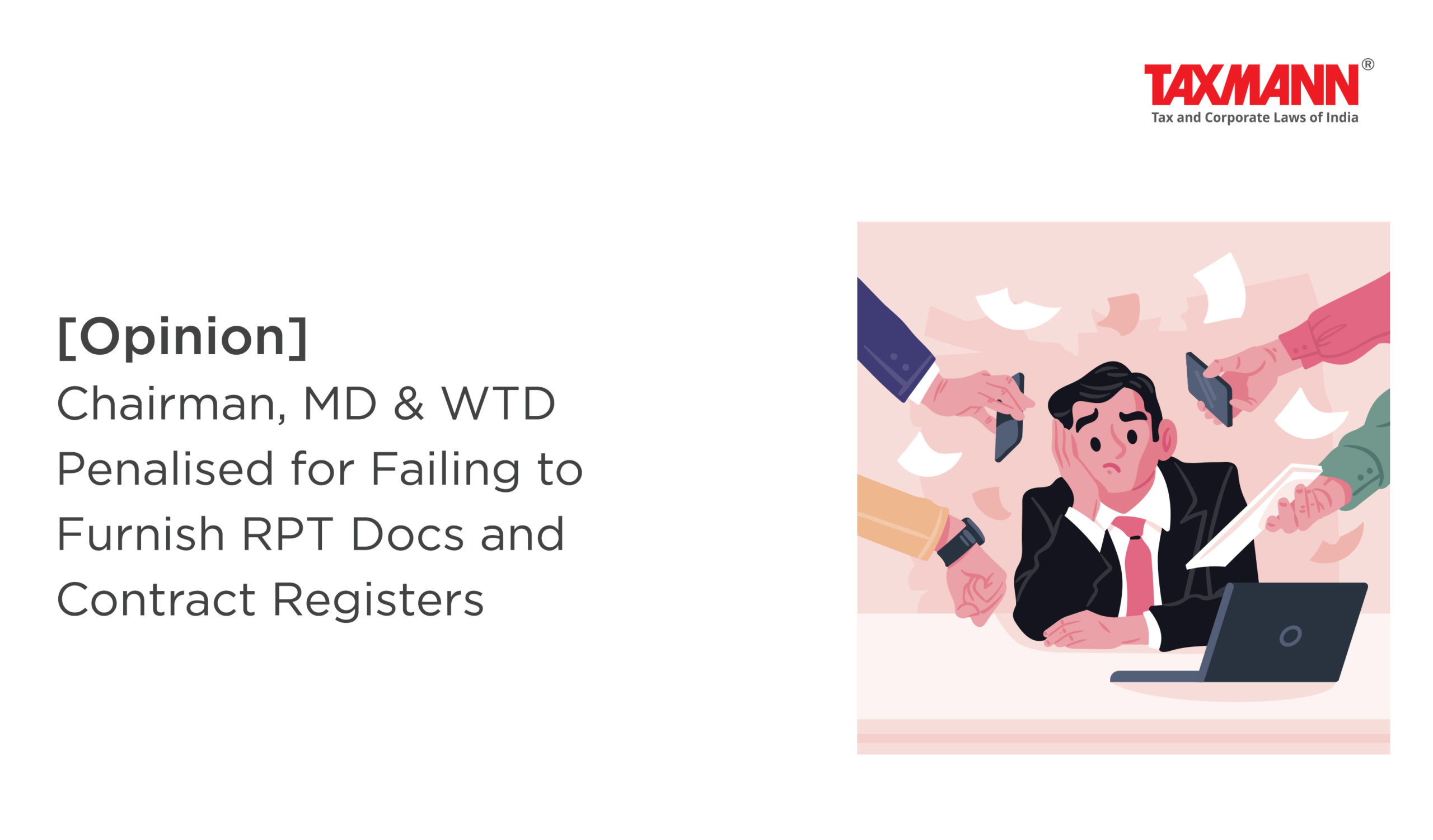[Opinion] Chairman, MD & WTD Penalised for Failing to Furnish RPT Docs and Contract Registers
- Blog|News|Company Law|
- 2 Min Read
- By Taxmann
- |
- Last Updated on 1 June, 2023

Prof R Balakrishnan – [2023] 150 taxmann.com 509 (Article)
1. Related Party transactions
Related-party transaction to a deal or arrangement made between two parties who are joined by a pre-existing business relationship or common interest. Companies often seek business deals with parties with whom they are familiar or have a common interest. Although related-party transactions are themselves legal, they may create a conflict of interest or lead to other illegal situations. In view of this, the related party transactions are being regulated by the Companies Act 2013 for all companies and in addition to the SEBI (Listing Obligation & Disclosure Requirements) Rules 2015 regulates listed companies.
By going through the fourth proviso to sub-section (1) of section 188 of the Companies Act 2013, it could be seen that if a company has undertaken related party transaction on an arm’s length basis and that too during the ordinary course of business, the company is not required to comply with the provisions under section 188 of the Companies Act 2013 and the rules made thereunder. However, the onus of maintaining the required documentary evidence and establishing that the relevant related party transactions undertaken by the company is in fact on an arm’s length basis and that too during the ordinary course of business is entirely the responsibility of the company directors / KMPs of the company. Since the burden to establish that the transaction is at arm’s length and in the ordinary course of business would be on the company and its officials. The company therefore, should create and maintain appropriate and adequate documentation with regard to price and terms of supply and such other details relating to the related party transactions.
2. Maintenance of register of particulars of all the transactions to which RPT applies
Every company is required to keep one or more registers giving separately the particulars of all contracts or arrangements to which sub-section (2) of Section 184 or Section 188 of the Companies Act 2013 applies read with Rule 16 of Companies (Management & Administration) Rules 2014, in form MBP-4 containing the following particulars:
(a) Company or companies or bodies corporate, firms or other association of individuals, in which any director has any concern or interest, as mentioned under sub-section (1) of section 184:
Provided that the particulars of the company or companies or bodies corporate in which a director himself together with any other director holds two percent or less of the paid-up share capital would not be required to be entered in the register;
(b) Contracts or arrangements with a body corporate or firm or other entity as mentioned under sub-section (2) of section 184, in which any director is, directly or indirectly, concerned or interested; and
(c) Contracts or arrangements with a related party with respect to transactions to which section 188 applies.
The MBP-4 register (s) is/are required to be placed before the next meeting of the board and signed by all the directors present in the meeting.
Click Here To Read The Full Article
Disclaimer: The content/information published on the website is only for general information of the user and shall not be construed as legal advice. While the Taxmann has exercised reasonable efforts to ensure the veracity of information/content published, Taxmann shall be under no liability in any manner whatsoever for incorrect information, if any.

Taxmann Publications has a dedicated in-house Research & Editorial Team. This team consists of a team of Chartered Accountants, Company Secretaries, and Lawyers. This team works under the guidance and supervision of editor-in-chief Mr Rakesh Bhargava.
The Research and Editorial Team is responsible for developing reliable and accurate content for the readers. The team follows the six-sigma approach to achieve the benchmark of zero error in its publications and research platforms. The team ensures that the following publication guidelines are thoroughly followed while developing the content:
- The statutory material is obtained only from the authorized and reliable sources
- All the latest developments in the judicial and legislative fields are covered
- Prepare the analytical write-ups on current, controversial, and important issues to help the readers to understand the concept and its implications
- Every content published by Taxmann is complete, accurate and lucid
- All evidence-based statements are supported with proper reference to Section, Circular No., Notification No. or citations
- The golden rules of grammar, style and consistency are thoroughly followed
- Font and size that’s easy to read and remain consistent across all imprint and digital publications are applied



 CA | CS | CMA
CA | CS | CMA
